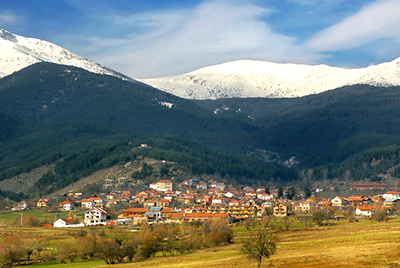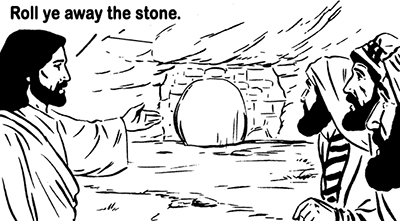 There’s a lot online now about “the mark of the Beast”. So many people are concerned about this that I feel I should say something. I put off writing this article but several people recently wrote me about this.
There’s a lot online now about “the mark of the Beast”. So many people are concerned about this that I feel I should say something. I put off writing this article but several people recently wrote me about this.
Is “the mark of the Beast” already here? Can it be forced on you? Is the Covid 19 vaccine “the mark of the Beast”? A great Bible verse to remember in times like this is, “God is not the author of confusion…” (I Corinthians 14:33).
I wonder how many people even know what “the mark of the Beast” is or, I should say, what it will be. It’s in the news a lot currently, even in some of the mainstream media. Briefly, “the mark of the Beast” is found in the book of Revelation, mainly in chapter 13. This chapter is about the last “forty-two months” (Revelation 13:5) before the return of Jesus to this earth as the King of God that he is.
Here’s the most specific thing in Scriptures about the mark of the Beast.
“And he causes all, both small and great, rich and poor, free and bond, to receive a mark in their right hand, or in their foreheads. And that no man might buy or sell, save he that had the mark, or the name of the beast, or the number of his name. Here is wisdom. Let him that has understanding count the number of the beast, for it is the number of a man. And his number is six hundred and sixty six.” (Revelation 13:16-18)
Of course, including this here may bring to mind more questions than it does answers. Who is the “he” mentioned at the beginning? What kind of “mark” is it talking about? Some kind of tattoo? Or like what many now say: an implant of some kind? What does that mean about “666”?  Or even the simply question: what is “the beast”? I’ll answer that one right away. “The beast” is the Antichrist of the endtime who’s been predicted to come in many places both in the Old and New Testament.
Or even the simply question: what is “the beast”? I’ll answer that one right away. “The beast” is the Antichrist of the endtime who’s been predicted to come in many places both in the Old and New Testament.
But it gets worse. Because the next chapter, chapter 14, tells us that
“…the third angel followed them, saying with a loud voice, “If any man worships the beast and his image and receives his mark in his forehead or in his hand, the same shall drink of the wine of the wrath of God which is poured out without mixture into the cup of his indignation. And he shall be tormented with fire and brimstone in the presence of the holy angels and in the presence of the Lamb.” (Revelation 14:9 & 10)
 So the Bible says that in the very last days, no person will be able to buy or sell unless they have “the mark of the beast”. And then it says that anyone who does accept the mark of the beast will be punished with the wrath of God. Wonderfully, we can fall back on the strong promise in God’s Word, that “He will not allow us to be tempted above that we are able to bear but with the temptation he will make a way of escape, that we may be able to bear it.” (I Corinthians 10:13)
So the Bible says that in the very last days, no person will be able to buy or sell unless they have “the mark of the beast”. And then it says that anyone who does accept the mark of the beast will be punished with the wrath of God. Wonderfully, we can fall back on the strong promise in God’s Word, that “He will not allow us to be tempted above that we are able to bear but with the temptation he will make a way of escape, that we may be able to bear it.” (I Corinthians 10:13)
And this is exactly what the Bible says that God is planning to do in this last period of 3½ years before the second coming of the Lord. We’ve seen what is said about all this in Revelation chapter 13 and 14. But in Revelation chapter 12, there are incredible promises to His believing children, the Christian believers of the final days. Twice in the chapter, it says almost the same thing. Verse 6 of Revelation 12 says
“And the woman fled into the wilderness, where she has a place prepared of God, that they should feed her there a thousand two hundred and sixty days.”
Then perhaps for emphasis and to underline the Lord’s faithfulness to His bride, the body of believers in the final days, verse 14 says,
“And to the woman were given two wings of a great eagle, that she might fly into the wilderness, into her place, where she is nourished for a time, and times, and half a time from the face of the serpent.”
For an explanation of that phrase referring to “a time, times, and half a time”, see the video I did on Daniel 7, at around the 24:32 mark, where I explain about this. Daniel chapter 7 is the first place in the Bible where that phrase, “a time, times, and half a time”, is used to refer to 3.5 years. But it comes up in other Scriptures many more times after this.
Where does this leave us? Are we all going to be killed if we don’t take the mark of the beast? Or sent to the lake of fire if we do? I certainly don’t believe that those are our only two options.
To keep this somewhat short, I’ll add in here the links to two articles I’ve done specifically on “the woman in the wilderness” that is spoken of in Revelation 12. Here is a recent article written on it.  And here is one, “Fleeing into the wilderness… in Bulgaria” that I wrote a few years ago, when I was in Bulgaria, on the subject of “the woman in the wilderness” in the final days.
And here is one, “Fleeing into the wilderness… in Bulgaria” that I wrote a few years ago, when I was in Bulgaria, on the subject of “the woman in the wilderness” in the final days.
I don’t believe you can be forced to take the mark of the beast, when it does ultimately appear, probably in times soon to come. God is not going to pour out His wrath on you because you were compelled to go against His will. “You are of God, little children, and have overcome them, because greater is He that is in you than he that is in the world”. (I John 4:4)
Neither do I believe at all that any upcoming vaccine against the corona virus is going to be, or contain, the mark of the Beast. This is ludicrous, unscriptural palaver. Christians really need to be reading up about things and not be victims of such shallow, politically motivated hearsay.
I get upset at how easily Christians nowadays are duped into believing the latest fad or “wind of doctrine” that blows their way concerning Bible prophecy. It may be a sign of how weak and unlearned the majority of believers are when it comes to knowledge of the prophetic end time.
If there is any good in the current hue and cry about the corona virus and the mark of the beast, it could be that at least it is getting out the basic idea that there will be a mark of the beast in the end time. This is similar to how the movie a few years back about “Left Behind” got out the idea of the second coming of the Lord, even though the central premise of that movie was that there would be a Rapture before the Great Tribulation which is false doctrine.
If you are currently worrying about the mark of the beast, I suggest you don’t. Instead, try to really get into the Word about it and the whole subject of the final days before the second coming of the Lord. I’ve spent the last few years in making a series of videos on the prophecies of Daniel which are featured on my website by that name where this article appears. There are also many blog articles that go into various aspects of the end times. I hope the material will be a blessing to you and that you will be able to grow in a knowledge of His Word for the difficult times that already face us and for the more difficult times soon to come.


 But so often, Pandora’s box being opened, you don’t realize what will come out. And people in America are talking amongst themselves about civil unrest, both on the Right and on the Left. People have been heavily armed here for years. And sadly the Christians are just as much in the middle of all this as anyone.
But so often, Pandora’s box being opened, you don’t realize what will come out. And people in America are talking amongst themselves about civil unrest, both on the Right and on the Left. People have been heavily armed here for years. And sadly the Christians are just as much in the middle of all this as anyone. Almost all my relatives came to Texas after the Civil War in the 1860’s, from Mississippi and Alabama after the war there had brought their lives to ruin and havoc. They fled like Syrians have done in our times; they crossed the Mississippi River and came to Texas.
Almost all my relatives came to Texas after the Civil War in the 1860’s, from Mississippi and Alabama after the war there had brought their lives to ruin and havoc. They fled like Syrians have done in our times; they crossed the Mississippi River and came to Texas. a little bit of reconciliation appear in the air, the Corona virus begin to subside and happy days be here again.
a little bit of reconciliation appear in the air, the Corona virus begin to subside and happy days be here again.
 But can we turn to the liberal party of the left? Pardon me but it’s like we have two choices. “
But can we turn to the liberal party of the left? Pardon me but it’s like we have two choices. “ Solution? I’m not sure there is one. But some famous words of Jesus came to me this morning, “
Solution? I’m not sure there is one. But some famous words of Jesus came to me this morning, “ God even told the prophet Jeremiah, just before the collapse of his nation around 600 years before Jesus, “
God even told the prophet Jeremiah, just before the collapse of his nation around 600 years before Jesus, “
 Jesus said one time, “
Jesus said one time, “ Or is it more important to just be as raw and visceral as you want to be and then let the chips fall where they may? What sacrifices are worth making in order to reach your goal?
Or is it more important to just be as raw and visceral as you want to be and then let the chips fall where they may? What sacrifices are worth making in order to reach your goal? But if they don’t commit murder, their words spoken in haste and without love or wisdom go out as firebrands and stick in the hearts of ones who are often friends or loved ones. David’s son, Solomon, said, “
But if they don’t commit murder, their words spoken in haste and without love or wisdom go out as firebrands and stick in the hearts of ones who are often friends or loved ones. David’s son, Solomon, said, “ There are things that need to be changed, things that have been tolerated for far too long. A good measure of vehemence and righteous exasperation is needed in order to keep some of these subjects on the boil until changes have been made and corners turned.
There are things that need to be changed, things that have been tolerated for far too long. A good measure of vehemence and righteous exasperation is needed in order to keep some of these subjects on the boil until changes have been made and corners turned. It will only happen at the return of “
It will only happen at the return of “
 Progress has been made in these things and
Progress has been made in these things and  Sad stuff. Of course not everyone is like that. But ageism is just as real in our times and felt by folks just as much as is racism or sexism. It’s a waste of human resources as well as a lack of vision. What some short sighted people don’t get is the wealth of knowledge and experience that “older people” have gained. Certainly some folks who are into their 60’s are not able to do as much physically as they did before. But on the other hand many of them are really doing just fine and have a lot of gas in the tank and fire in the belly. The Bible says, “
Sad stuff. Of course not everyone is like that. But ageism is just as real in our times and felt by folks just as much as is racism or sexism. It’s a waste of human resources as well as a lack of vision. What some short sighted people don’t get is the wealth of knowledge and experience that “older people” have gained. Certainly some folks who are into their 60’s are not able to do as much physically as they did before. But on the other hand many of them are really doing just fine and have a lot of gas in the tank and fire in the belly. The Bible says, “ However, not everyone does that. In the Bible, Caleb, at the age of 85 famously said, “
However, not everyone does that. In the Bible, Caleb, at the age of 85 famously said, “ Rather,
Rather,  Paul said to Timothy, “
Paul said to Timothy, “
 There’s just real wisdom to, in certain situations, being very practical and not procrastinating. “Hesitate and all is lost” is a saying many of us have heard. Practical common sense yesterday was to just run get a shovel and smash the thing. It was that dangerous. Similarly in these times, those who survive, individuals and societies, are the ones who recognize the danger, recognize also what the needed response should be, and then do it.
There’s just real wisdom to, in certain situations, being very practical and not procrastinating. “Hesitate and all is lost” is a saying many of us have heard. Practical common sense yesterday was to just run get a shovel and smash the thing. It was that dangerous. Similarly in these times, those who survive, individuals and societies, are the ones who recognize the danger, recognize also what the needed response should be, and then do it. For one, focus. If there suddenly had been a big discussion and argument about what path to take as the snake slithered towards the house, that would not have been smart. Some could argue for the rights of the snake, the moral implications of whether it should be killed or not. Sides could be taken and more time spend on who was to blame, why this had happened, if we were seeing things the right way, is there an agenda, if the snake was even there or not and who could end up wining the high ground with their viewpoint on the crisis that was there on the ground.
For one, focus. If there suddenly had been a big discussion and argument about what path to take as the snake slithered towards the house, that would not have been smart. Some could argue for the rights of the snake, the moral implications of whether it should be killed or not. Sides could be taken and more time spend on who was to blame, why this had happened, if we were seeing things the right way, is there an agenda, if the snake was even there or not and who could end up wining the high ground with their viewpoint on the crisis that was there on the ground. May God help us all to be clear minded, unprejudiced, not too cerebral, political or holding on to old prejudges in this very real time. Lord help us to move fast when we need to, to not procrastinate or overestimate our safety and underestimate the dangers that are about. And may the Lord help us to pull together, to love our neighbors, walk in wisdom and even be led of Him so we can make it through this time that is unprecedented in the lives of almost all of us.
May God help us all to be clear minded, unprejudiced, not too cerebral, political or holding on to old prejudges in this very real time. Lord help us to move fast when we need to, to not procrastinate or overestimate our safety and underestimate the dangers that are about. And may the Lord help us to pull together, to love our neighbors, walk in wisdom and even be led of Him so we can make it through this time that is unprecedented in the lives of almost all of us.
 His cousin John the Baptist exclaimed to a crowd of followers as he saw Jesus approaching, “
His cousin John the Baptist exclaimed to a crowd of followers as he saw Jesus approaching, “

 Let’s try this one. Let’s say you make some kind of light hearted, spontaneous, off-hand joke about your mother or wife, your sister or girl friend. Someone immediately frowns vehemently and, shaking their finger at you, says forebodingly, “
Let’s try this one. Let’s say you make some kind of light hearted, spontaneous, off-hand joke about your mother or wife, your sister or girl friend. Someone immediately frowns vehemently and, shaking their finger at you, says forebodingly, “ Same with “racist”. John Wayne movies from when I was a kid had white cowboys galloping through Native American villages, firing their rifles indiscriminately as indigenous women and children were seen running from the mounted white men. But the white men were depicted as the good guys. The TV of my youth is now recognized as, at times, overtly sickeningly racist. If you want to read about my racist past, you can read “
Same with “racist”. John Wayne movies from when I was a kid had white cowboys galloping through Native American villages, firing their rifles indiscriminately as indigenous women and children were seen running from the mounted white men. But the white men were depicted as the good guys. The TV of my youth is now recognized as, at times, overtly sickeningly racist. If you want to read about my racist past, you can read “ It’s like another fearsome, powerful red card word, not the most powerful but certainly up there in rank: terrorist. Having lived in over 50 countries, I’ve come to experience how a “terrorist” as seen in one country is a “freedom fighter” in another. And I’m not talking about the views of some rogue state. I’m talking about the difference between how people in the USA look at things compared to our closest allies in Europe.
It’s like another fearsome, powerful red card word, not the most powerful but certainly up there in rank: terrorist. Having lived in over 50 countries, I’ve come to experience how a “terrorist” as seen in one country is a “freedom fighter” in another. And I’m not talking about the views of some rogue state. I’m talking about the difference between how people in the USA look at things compared to our closest allies in Europe.
 Probably most believers know (if they know much about the Bible) that it’s full of commandments to action, not just prayer. “Go into all the world.” “Roll away the stone.” “Teach all nations”. “Visit the fatherless and widows.” And on and on it goes.
Probably most believers know (if they know much about the Bible) that it’s full of commandments to action, not just prayer. “Go into all the world.” “Roll away the stone.” “Teach all nations”. “Visit the fatherless and widows.” And on and on it goes. One of the most famous Christian fighters of those times against drinking was
One of the most famous Christian fighters of those times against drinking was  Did the Salvation Army offer “thoughts and prayers” back then? I’m sure they did. But the Christian activists of those times who went into bars and starting destroying the places are perhaps reminiscent of Jesus going into the temple in Jerusalem with a whip. Seems to be a pretty good example there of the Lord Himself getting active against a prevailing evil of His time when He was here on earth.
Did the Salvation Army offer “thoughts and prayers” back then? I’m sure they did. But the Christian activists of those times who went into bars and starting destroying the places are perhaps reminiscent of Jesus going into the temple in Jerusalem with a whip. Seems to be a pretty good example there of the Lord Himself getting active against a prevailing evil of His time when He was here on earth. And certainly it can be mentioned with this that the Civil Rights movement in the southern USA in the 1960’s was frequently led by ordained ministers, black and white. These ones came to feel that simply praying against the racism and injustice that had prevailed for so long was just not all that the Lord wanted them to do. There is no greater example of that than
And certainly it can be mentioned with this that the Civil Rights movement in the southern USA in the 1960’s was frequently led by ordained ministers, black and white. These ones came to feel that simply praying against the racism and injustice that had prevailed for so long was just not all that the Lord wanted them to do. There is no greater example of that than 

 So I got mocked by everyone for saying “Negro”, which was the accepted non-racist word that was used back then. I was a little weird. But my folks told me how that hating people because of the color of their skin was wrong and evil, even though most of my friends who did were all Christians and went to church while my family were not Christians.
So I got mocked by everyone for saying “Negro”, which was the accepted non-racist word that was used back then. I was a little weird. But my folks told me how that hating people because of the color of their skin was wrong and evil, even though most of my friends who did were all Christians and went to church while my family were not Christians. You could think, “OK, now he won’t be weird anymore. He’s going to be a nice, normal Christian, settle into society and be like everyone else.”
You could think, “OK, now he won’t be weird anymore. He’s going to be a nice, normal Christian, settle into society and be like everyone else.”